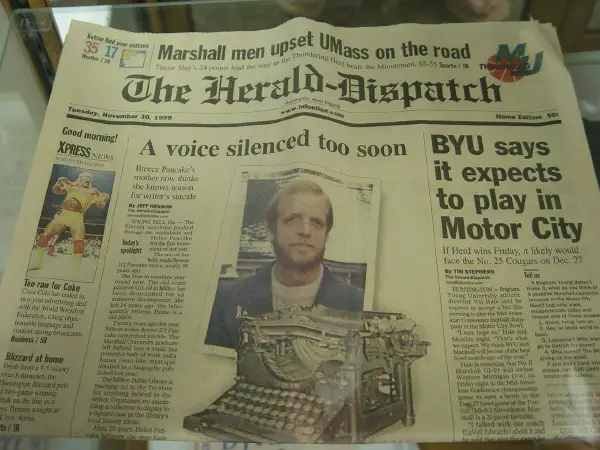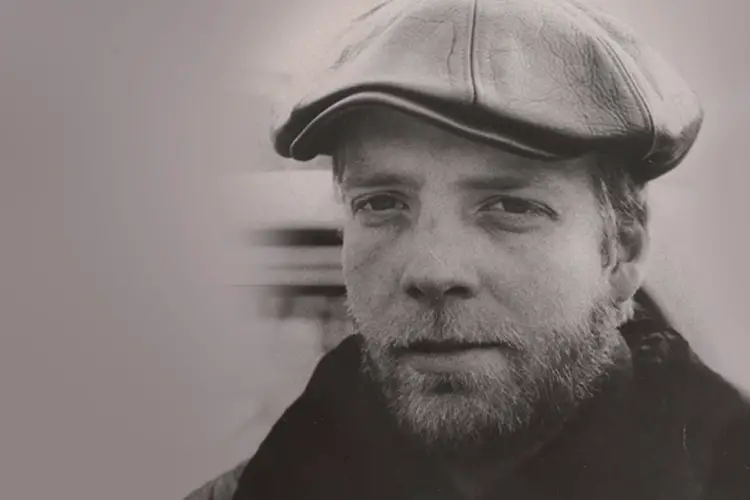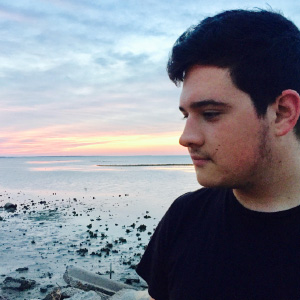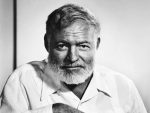Like so many, I found Breece D’J Pancake’s work by accident. Before my sophomore year of college, I found a click-bait article on the “Best Books to Read in Your Twenties” (or something like that). There were the standards: “1984,” “On The Road,” “The Alchemist,” some nonfiction works and several commercial novels. Typical, nothing I haven’t seen. The article concluded with Pancake’s short story collection, “The Stories of Breece D’J Pancake,” the writer, unable to convey how much these stories meant to them, said that it deserved number-one on any list.
I was intrigued. First by the name, Pancake, then by how out of place this work seemed. Comparing to the other listed works, nearly all staples of literature, this outlier came stepping on the biggest of shoes. I ordered the unassuming paper-back, hoping not to have been duped by a click-bait writer who had no business suggesting readings.
Since then, the fiction I’ve read is split in two categories—the stories I’ve read before Pancake’s, and everything after. It seems sacrilegious to have a favorite writer, but Pancake has become more to me than a dependable nightstand book. His stories are the standard I apply to any fiction I read, and the collection is always on my person. Why this near-fanatical devotion to one writer? Maybe it’s my passive way of grieving. Pancake took his own life at twenty-six years old, leaving twelve short stories, some poems and an Appalachian mountain’s worth of potential. His motive for suicide is as unclear as what could have been.

Set in rural West Virginia, Pancake’s sole published work is heavily influenced by the events of his own short life. He wandered Milton, Virginia, as an adolescent, stopping to overhear conversations of the older men and women of town, and he was known to eat in soup kitchens with the homeless. Pancake was also an avid outdoorsman, hunting squirrels and rabbits with his father, even camping alone in the Virginia wilderness. Pancake’s mother, Helen, has been quoted as saying he never enjoyed the killing.
One story, “Hollow,” ends with Buddy, an alcoholic coal miner, hunting a deer after waking up from a drunken daze. Buddy’s harvest is done out of necessity, realizing he has no food. The scene is described calmly, but there is still intensity between the hunter and the hunted. Buddy’s girlfriend, Sally, has left him, and he is battered from an earlier bar fight; the woods, and the fresh kill he eats raw, are restorative, and perhaps the only stability in his life. Through this solitary lifestyle, Pancake developed an intense sensitivity to his surroundings. John Casey, professor and friend of Pancake, attested that he knew the West Virginia area “not as a pastime, but as such a deep part of himself he couldn’t help but dream of it.”
Reading Pancake’s stories, however, makes one believe that he was haunted by his home. The death of his father from alcoholism, who he was extremely close to, and friend, by a gruesome car accident, come up subtly in his short stories. Families are crippled by dying farms and disease. Relationships between the narrator and their significant other crumble when neither finds an escape in the other. There is also a helplessness surrounding Pancake’s characters, starring people in ruts or returning to them. The characters are embracing a common small-town attitude—a desire to leave with no intentions of doing so. Their homes are all they know, and though they want something more, it is likely to never come. They cannot see what is outside, being buried neck-deep in the land.
He’s been compared to Hemingway, William Faulkner, James Joyce, Flannery O’Connor and Samuel Beckett.
There are the outliers, however. One story, “The Salvation of Me,” describes an unnamed male narrator who dreams of leaving his mechanic job after developing an interest to relocate to Chicago. This grows into a near obsession when fellow mechanic Chester leaves the small town on a whim. The impulsive nature the narrator yearns for teases him when Chester returns.
This story is especially unique—a character returning to the squalor of home after being, assumedly, successful. There are allusions to the idea that identity is dependent on being grounded, making the small West Virginian town’s imprint far more-reaching than the people who attempt to leave believe. A quote on the cover of the book from Joyce Carol Oates compares Pancake’s literary debut to Ernest Hemingway’s, referencing the short story collection “In Our Time.” Like Hemingway’s writing style, Pancake’s use of terse, clean prose leaves no room for filler. Unlike Hemingway, however, is the scene is told but not always directly. The reader is instead introduced to the motion—a sporadic, tense mix of movement that throws the reader into Pancake’s Earth.
“He sees the bridge coming, sees the hurt in it, and says aloud his name, says, ‘Ottie.’ It is what he has been called, and says again, ‘Ottie’…Now and again, his nerves bang one another until he sees a fist, a fist gripping and twisting at once, then hot water runs down the back of his throat…there is no more memory, only years on the hustle with a semi-truck—years roaring with pistons, rattling with roads, waiting to sift out one day…”
These lines from the first paragraph of “In The Dry” have condensed an event and its aftermath with the action alone. Admittedly, I’ve had to read Pancake’s stories several times because of his description style. The work demands to be read carefully, as if Pancake intended for the reader to swallow every word like a pill.
The young author was guided by his colleagues at the University of Virginia’s creative writing program: Casey, Andre Dubus III and James Alan McPherson, who would later teach at the Iowa Writer’s Workshop. The West Virginian is a noted influence of Chuck Palahniuk and Cormac McCarthy. Kurt Vonnegut, in a letter to Casey concerning Pancake’s suicide, called him “the best writer, the most sincere writer I’ve ever read.” He’s been compared to Hemingway, William Faulkner, James Joyce, Flannery O’Connor and Samuel Beckett. Yet, Pancake largely remains unheard of. It seems most of Pancake’s readers discover his stories by accident, whether by bookstore or a click-bait article. One would think that the stories have picked the readers, not vice versa.
I believe this is the most appealing aspect of Pancake’s stories: a writer is so good that even the most causal of reader can recognize it. A writer this approachable, one that can shove a reader into a world that is unknown, or flat out ignored, is more necessary now than it has ever been. To experience the world of another has become difficult, for whatever reason. Pancake’s work, like so many other great works of literature, make it possible to provide empathy with people we’d otherwise wouldn’t give a second glance to.











[…] I’d like to cover as a journalist. I’ve written about immigrant rights, climate change, writers, race relations, even dating apps. These, of course, are all opinions. But my method of researching […]